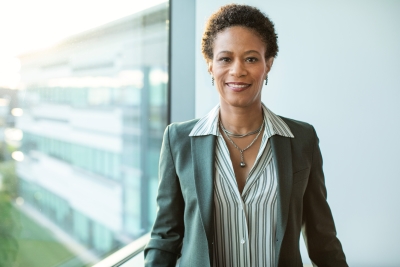What does ESG mean at Boston Scientific? Ask its newest VP, Kathryn Unger

Climate change. Environmental protection. Hiring inequities. Economic disparities. Over the past few years, Environmental, Social and Governance (ESG)—or the priorities a company shares publicly for how it operates its business and cares for the world around it—has increasingly become an area of focus for Boston Scientific.
To that end, the company recently appointed Kathryn Unger to the newly created role of vice president of ESG.
And while this is her first ESG-related job, it’s one that she’s personally passionate about and for which Unger is uniquely qualified: From her first job as a high school teacher to a more recent role leading a large, highly regulated business, she’s a seasoned executive with deep, diverse experiences to draw from.
We sat down with her to find out more about how she defines ESG, how Boston Scientific is leading its peers when it comes to its environmental goals and why this work is so crucial for the sake of the planet as well as the patients, customers and employees Boston Scientific serves.
You’ve held several leadership positions in your career, but this is your first position in ESG. How has your previous work experience prepared you for this role?
A: I feel incredibly fortunate that I've worn a number of hats.
Teaching was the best first challenge I could have ever had. If you can give five presentations a day to a highly hostile high school audience, you can do just about anything. You have to care about the next generation to do that job, and that's part of ESG.
At Cummins Inc., where I led the Rail and Defense engine business, I learned what it means to be a global company, how to manage product development and life cycles and how to grow customers and sales.
And at Cargill, I worked with supply chain and sales and production, and as a vice president in government relations. So I really have an awareness of all the pieces of ESG that I wouldn't have if it weren't for all those experiences.
ESG has become a bit of a corporate buzzword. What does it mean to you, personally?
A: My husband and I are very passionate about helping to take care of the environment and the planet on which we live for the sake of generations to come. In fact, we had an organic farm in North Carolina where we used very sustainable growing practices, just because we felt that was important.
As a Black woman and someone who believes in building and nurturing the communities in which we work and live, I’m on the board of Urban Ventures, which is a not-for-profit that is working to stop the cycle of generational poverty. It's a very personal commitment to me.
What progress has Boston Scientific made when it comes to ESG?
A: Boston Scientific has made strong progress against its ESG goals. For example, just before I joined the company, Boston Scientific committed to setting science-based environmental and sustainability targets and had them validated by the Science Based Target initiative (SBTi). We’re one of the first companies in the Healthcare Equipment and Supplies sector to have our net-zero, science-based targets approved under the SBTi Net-Zero Standard, which is really amazing.
Basically, this means our near and long-term targets for reduction of greenhouse gas and carbon emissions are scientifically backed and aligned with the latest climate science, setting us on a path toward net-zero carbon emissions across our entire value chain by 2050.
But there is so much more work to do together with our external partners and suppliers to continue to achieve these targets and advance our collective efforts to contribute to a healthier planet. Regulations are increasing and evolving. Customer expectations are evolving. Science is constantly evolving and changing the things that we can accomplish for our customers and patients.
As all of these things change, the goal posts also change. At Boston Scientific, we are just always trying to be ever better. I think we must always look at ESG through that lens.